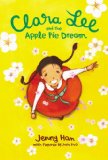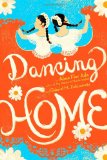I love reading multi-cultural fiction (for adults)**, specifically books that deal with 1st-generation Americans in conflict with their foreign-born parents and what they feel is their home, America. Which culture do they truly belong to? In most cases, the answer is both, which makes them all the richer (at least in my very white, very American mind). This rhetoric is expressed verbatim in each of these books, either in the mind of the protagonist or in a conversation with one of their friends or relatives.
Dancing Home by Alma Flor Ada and Gabriel M. Zubizarreta
Though I’ve read many novels (for adults and children) that deal with immigration and assimilation to the U.S., I haven’t read any that deal with Mexican Americans, which are a significant population in the U.S. (especially here in Texas where I live, and in California where the story takes place.
Margarita was born in America, and she makes sure everyone knows it. When she first moved from Texas to California, some of the boys made fun of her, but since then, she’s just 100% Margie. When her cousin Lupe comes from Mexico to live with them, Margie realizes her conflicting feelings about her origin. She speaks and understands some Spanish, but when Lupe first arrives, she doesn’t know much English, so Lupe and her parents converse rapidly in Spanish, and Margie feels left out.
Lupe gets involved in the flamenco dance group, and later Margie ends up standing in, and being surprised to like it.
Both Margie and Lupe learn and grow — in their feelings for each other and for their Mexican and American heritages. There are so many plots involving many characters including Lupe and her estranged father and even Margie’s friend Camille, but they are so skillfully told that each of these little gems adds to the overall beauty of the story.
This is a short book, but the story unfolds in such a nice, easy way. The change that comes about in Margie and Lupe doesn’t feel rushed at all, since the story takes place over almost a year.
I also noticed that this was published in English and Spanish (Nacer Bailando) simultaneously.
Clara Lee and the Apple Pie Dream by Jenny Han
 Clara Lee is only in 3rd grade, so I’m not sure that she’s done a lot of deep pondering about her racial identity. Her grandfather lives with her, and so there’s definitely a mix of his culture and her new American culture.
Clara Lee is only in 3rd grade, so I’m not sure that she’s done a lot of deep pondering about her racial identity. Her grandfather lives with her, and so there’s definitely a mix of his culture and her new American culture.
Clara Lee decides she wants to run for Little Miss Apple Pie, but does begin to wonder if she’s American enough. But as much as her doubt over her culture (mostly brought to her mind by a mean classmate), this sweet story also deals with friendship issues, self-confidence, and going for your dreams.
It’s a shorter book with a fairly large-type print, making it perfect for 8 – 9 year old readers (and younger high-level readers).
I previously reviewed two other Cybils nominees that deal with this theme in this exact same way:
**These books do a great job of exploring this theme. Though they are for kids, adults interested in this theme will probably enjoy them, as I did. Some of my very favorite books for adults that cover this same idea are The Namesake and Girl in Translation.
 Though I am a Round I panelist in this Middle Grade fiction category for the Cybils, my opinions are solely my own and are not meant to reflect the final outcome.
Though I am a Round I panelist in this Middle Grade fiction category for the Cybils, my opinions are solely my own and are not meant to reflect the final outcome.
Don’t miss a thing: Check out our current giveaways. Subscribe to our feed or video reviews on YouTube. Follow us @5M4B on Twitter or on Facebook.
Though it’s a challenge, Jennifer Donovan can’t imagine one more fun than reading as many of the nominees as she can in this 2 1/2 month timeframe. That’s one reason she doesn’t blog at Snapshot so much anymore.
